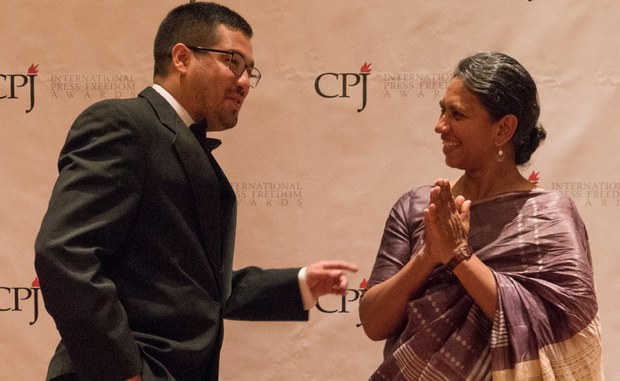India: Journalist Shares Insights into Her Reporting on Maoist Conflict
2016.12.26
New Delhi
 International Press Freedom Award honorees Óscar Martínez and Malini Subramaniam appear at the awards ceremony in New York, Nov. 22, 2016.
International Press Freedom Award honorees Óscar Martínez and Malini Subramaniam appear at the awards ceremony in New York, Nov. 22, 2016.
The year 2016 has proved memorable for Malini Subramaniam, an Indian journalist who recently won a prestigious award for reporting on a Maoist insurgency in the state of Chhattisgarh.
“It’s by far been the unforgettable year of my life for reasons both good and bad,” Subramaniam, 52, told BenarNews.
The year started with police detaining the freelance reporter until she agreed to leave Chhattisgarh for good in February, and it culminated with her being honored last month with the International Press Freedom Award – handed out annually by the U.S.-based Committee to Protect Journalists (CPJ).
The Maoist or Naxalite insurgency, which was born in 1969 as a left-wing uprising among the peasantry, is an armed struggle against what its supporters call illegal exploitation by successive governments of the tribal and peasant population in the resource-rich forests of central and eastern India.
While several journalists, including Subramaniam, who have exposed police brutality against the tribal population, have faced expulsion from Chhattisgarh, at least four reporters have allegedly been jailed over the past year or so on what critics have described as made-up charges.
“Those insisting upon freedom of the press and either arrested with trumped up charges or forced to leave the region,” said Subramanian, who now lives in the south Indian city of Hyderabad.
The crackdown on journalists, she said, was to ensure that anti-government news did not attract national and international attention.
“The arrests and hounding of journalists and their defenders has given way to a climate of fear that risks turning parts of Chhattisgarh into a media black hole,” according to CPJ’s Sumit Galhotra.
But police deny this accusation.
“The ground situation is very different from what is reported. People sitting far away from here are totally unaware of the ground reality,” a senior police official in the state, requesting anonymity, told BenarNews.
He alleged that Subramaniam was a Maoist, which is why she was asked to leave the state.
“She is a Naxalite. The fact that she has received an international award does not mean anything,” he said.
In a telephonic interview with BenarNews, Subramanian spoke at length about her work in the insurgency-stricken region.
BenarNews: Tell us about your journey as a media professional.
Malini Subramaniam: I have put in two decades of work in the development sector and three years as a humanitarian worker – all of which contributed to my reporting from a people’s perspective.
I focus on the human rights abuse in the Bastar region of Chhattisgarh State primarily for an Indian news portal called Scroll.in. My work reflects not just the violence in the region, but also the effects of the violence on both the Adivasis (tribals) and non-Adivasis living in Maoist-affected regions, and how they cope.
BN: How did you and your family cope with all the negativity?
MS: It was obviously unnerving. Initially we thought the vicious campaign against me would eventually die down. After all, we live in the world’s largest democracy. Everyone need not like what I write but I have every right to put forth by findings.
But as I continued to report, the campaign by the civil vigilante groups only worsened with attacks aimed at forcing me to leave the state. The police colluded with these groups. It was shocking.
My husband was understanding but feared for our safety. My two daughters too were aghast but encouraged me. As the campaign against me and the others working in Bastar intensified with the administration and police failing or rather deliberately refusing to provide protection or even assurance, alarm bells began ringing in our heads.
Physical attacks appeared imminent as were fears of arrest as they began pressurizing those close to us to testify against me.
BN: What is the situation in Chhattisgarh today?
MS: The situation is pretty grim and serious. Extra-judicial killings or fake encounters continue, as do forced surrenders and fake arrests.
The state is a haven of human rights abuse. Even going to the market to buy things needed for daily usage is a huge risk as many are picked up by the police when they go shopping.
Threats from the Maoists have also increased as more and more people are being coerced to surrender.
BN: Will the International Press Freedom Award be of any help to you in your work in Chhattisgarh?
MS: The award … is recognition of my reportage in the region in the face of difficulties – threats, harassment and eventual expulsion. I accepted this honor on behalf of all Indian journalists who have faced or continue to face similar or worse situations.
I am not sure if this award will be of any help to journalists attempting to expose police brutality in Maoist belts of India. But I hope the government wakes up and takes notice that the world is watching what it’s doing in these regions.







